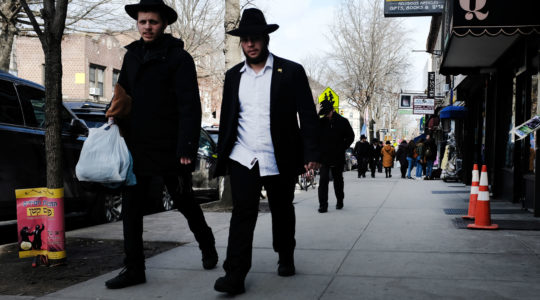LOS ANGELES, March 24 (JTA) — There are more than 3,000 printed versions of the Passover Haggadah in existence, according to educated estimates. And that’s not counting private Haggadahs, custom-made on the family computer. It’s a far cry from the 13th-century Spanish version, believed to be the first stand-alone Haggadah. In the following centuries, the Haggadah has been adapted, at times almost beyond recognition, by environmentalists, humanists, feminists, vegetarians, socialists, gays, lesbians and others. In other editions, the original focus has shifted to recognize the Holocaust, creation of Israel, and various political and ideological causes, with quotations ranging from Anne Frank to Ho Chi Minh. One of the latest entries is the slim, updated, Yiddish-leaning Sholem Family Hagada For a Secular Celebration of Peysakh. It is published by the Sholem Community of Los Angeles, a 50-year old secular Jewish educational, cultural and social institution, edited by the group’s “guide,” Hershl Hartman, and Jeffrey Kaye, and illustrated in full color by Kevin Bostwick. Like other secular or humanistic Haggadahs, the Sholem edition rejects the recitation of “deistic formulas or acceptance as literal truth of the myths of the traditional hagada.” However, it seeks to honor “the folk traditions that took inspiration from the [Exodus] legend to imbue generations with a commitment to social justice and equality.” Hartman said he had made a special effort “to keep the language fairly accessible to children while avoiding a childish tone that might repel or bore adults.” There are some innovations in the new version that might startle many synagogue-going Jews. For instance, the frogs and boils of the traditional Ten Plagues have been replaced by such manmade miseries as “the plague of homelessness,” “war,” “poisoned air and water” and “the nuclear shadow over our lives.” Besides the prescribed bitter herbs and charoset on the seder plate, an orange is added to symbolize “those not fully recognized by the Jewish community — women, gays, lesbians, bi-sexuals and transgendered people.” The Haggadah pays special tribute to the Warsaw Ghetto uprising during Passover 1943by including the Partisan Hymn and Binem Heller’s poem “Peysakh Has Come to the Ghetto Again.” In at least one important respect, tradition has remained unchanged in the rousing rendition of “Had Gadya,” the song about the kid my father bought for two zuzim. For information and to order the Sholem Hagada, call (818) 760-6625, or go to www.sholem.org/hagada.asp ..

Help ensure Jewish news remains accessible to all. Your donation to the Jewish Telegraphic Agency powers the trusted journalism that has connected Jewish communities worldwide for more than 100 years. With your help, JTA can continue to deliver vital news and insights. Donate today.





